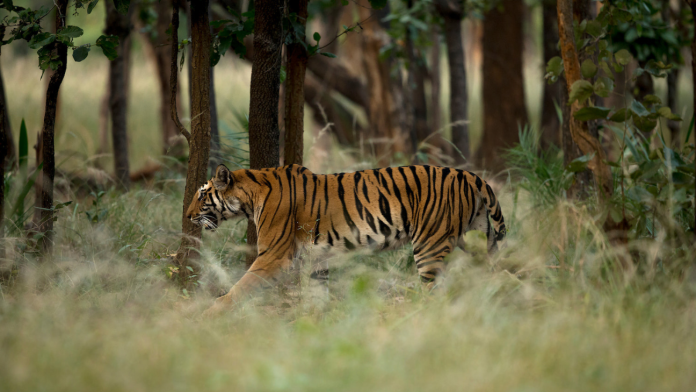Even a cat this powerful needs you to protect it from poachers
Just over a century ago, there were around 100,000 tigers roaming across Asia. Since then, habitat loss, fragmentation and poaching reduced numbers to as few as 3200 in 2010.
WWF’s long-term work in Asia has helped tiger numbers increase to around 5700 today. But tigers are still in trouble. With 92% of their historical range lost, conflict with humans, poaching and illegal wildlife trade continues to threaten them further.
Poachers are still killing a large number of tigers each year to supply the illegal trade in tiger parts. Ongoing consumer demand – for tiger skins, bones and more – is driving poaching and trafficking. 94 tiger deaths were attributed to poaching across India in the first six months of 2025.
As part of our wider effort to support tiger recovery, WWF are working to prevent poaching in target areas. This includes the Terai Arc Landscape, a richly biodiverse region across India and Nepal where tiger numbers are as low as ~820. We urgently need your support, so we can continue to protect tigers and diminish the deadly trade in their parts.
Looking out for tigers
With relatively few tigers surviving in the Terai Arc Landscape, and with poachers already on their tails, you’ll understand why there’s a growing number of people determined to stop tiger poaching – and reduce the illegal trade in their parts. WWF are supporting these brave individuals in the field, and we hope you will too.

The Bagh Mitras – Our Eyes and Ears ON The Ground

Lui Song – The Tiger Advocate Changing Minds in China

Rangers, putting their lives on the line to protect tigers
Poachers: The first link in the trade chain
Poaching is a complex issue. In the Terai Arc Landscape, some people resort to poaching as they have few other ways to support their families. But most poaching is driven by the demand for tiger parts in countries like China and Vietnam. Poachers are at the start of the chain followed by notorious traffickers and illegal sellers.
Poachers poison tigers or use snares that cause terrible injuries. Once a tiger is caught and killed, their parts are smuggled across borders where they are then sold by organised criminals behind the illegal trade. Majestic tigers that should be roaming the forests end up as souvenirs, tonics and status symbols.
Your support could help tackle demand and foster a shift in perspective where buying tiger parts gradually becomes unacceptable nationwide.
Tigers need us. But the world needs tigers more
The importance of saving stripes
Tiger landscapes provide many ecosystem services that go beyond the range of the tiger. Every tiger poached threatens the balance in the Terai Arc Landscape. With just ~820 left, every tiger poached threatens to tip the balance. Without tigers, the entire Terai Arc Landscape – and far beyond – could reach ecological collapse. It would be a disaster for nature – and catastrophic for the people who live in and around the area too.

If you protect tigers, you’ll protect so much more
Hundreds of millions of people rely on water from tiger reserves and these protected areas also provide disaster risk reduction against flooding and landslides. Research shows that tiger conservation efforts in India play a significant role in mitigating climate change. By protecting forests through the designation of tiger reserves in India, tiger conservation helped prevent the emission of 1 million metric tons of carbon dioxide between 2007 and 2020.

Tigers on top
Tigers and the diverse habitats they roam are deeply rooted together. A healthy tiger population is a sign of a healthy ecosystem. Tigers play a vital role in maintaining the biodiversity of other animal and plant species. Without tigers keeping populations of herbivore prey like deer in check, the impact they have on the landscape could make it unrecognisable.

Will you show tigers you’ve got their back?
You can help protect tigers and even increase their numbers. But you have to act now. A gift today will be a gift that lasts, funding so many areas of tiger conservation.

£15

£30

£50

Donate an amount
Your donation will help us to protect tigers across Asia and carry out vital conservation work around the world, thank you.



